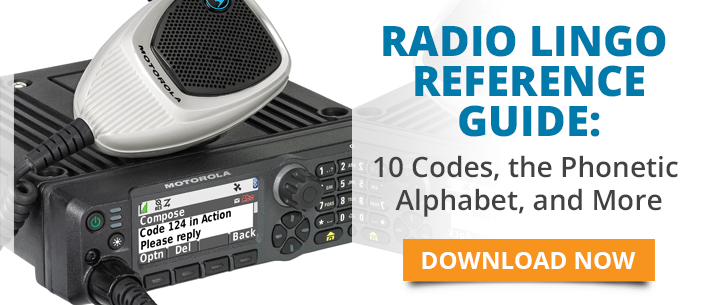 Anyone familiar with two-way radio lingo, particularly the military phonetic alphabet, will attest that the phrases, codes, and terms form a unique language that distinguishes its users from those who may not be familiar with its nuances.
Anyone familiar with two-way radio lingo, particularly the military phonetic alphabet, will attest that the phrases, codes, and terms form a unique language that distinguishes its users from those who may not be familiar with its nuances.
Public safety officials, military personnel, civilian users, and even 911 communications professionals can hold entire conversations using the phonetic alphabet or 10 codes that would leave non-radio users perplexed and scratching their heads in confusion.
Curious? Please keep reading to discover some of the most common phrases from the military phonetic alphabet and how they're used to ensure messages are understood clearly and accurately.
Why the Phonetic Alphabet?
The phonetic alphabet uses specific words to represent letters of the English alphabet, making radio communication clearer and simpler. The current U.S. military and NATO use the same international phonetic alphabet, adopted in the 1950s for global consistency. This alphabet includes words like Alfa for A, Bravo for B, and Zulu for Z, enhancing clarity and preventing communication misunderstandings.
The NATO alphabet is:
Alfa, Bravo, Charlie, Delta, Echo, Foxtrot, Golf, Hotel, India, Juliett, Kilo, Lima, Mike, November, Oscar, Papa, Quebec, Romeo, Sierra, Tango, Uniform, Victor, Whiskey, X-ray, Yankee, Zulu.
Common Phrases
The military phonetic alphabet, like the police phonetic alphabet, is used not only to
The military phonetic alphabet, along with similar systems like the police phonetic alphabet, is used not just for spelling out names, codes, or locations. It also allows for concisely communicating complete ideas or instructions using shorthand phrases.
Military personnel are known for their, ahem, colorful language, and the phrases below represent the most family-friendly, or PG, terms. The terms shared here are chosen for their general appropriateness, showcasing the more universally acceptable side of military communication.
Common military phonetic alphabet phrases include:
Bravo Zulu: Good job. The term’s roots in naval history explain why it’s “Bravo Zulu” and not “Whiskey Delta” for "well done."
Charlie Mike: Continue Mission
Echo Tango Sierra: Expiration Term of Service (someone who is about to complete their tour of duty)
Mikes: Minutes
November Golf: NG or No Go (fail)
Lima Charlie: Loud and Clear
Oscar Mike: On the Move
Tango Mike: Thanks Much
Tango Uniform: Toes Up, meaning killed or destroyed
Tango Yankee: Thank You
Wilco: Will Comply
These phrases, among others, are designed for precision and brevity in various operational contexts.
Any We Missed?
Like the ten codes for public safety, there are phonetic alphabet phrases that are more popular than others, depending on factors such as location and mission. Radio lingo enhances precision in everything from public safety to military operations and ensures that messages are conveyed without ambiguity.
Are there any common military phonetic alphabet phrases that we missed? Feel free to contact us to tell us!
Click here to get a free estimate on the best communications solution for your agency or business.



